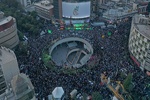Nader Entessar, a regular commentator on political issues to Mehr News International Service told Payman Yazdani that nuclear agreement was a multidimensional, with far-reaching implications for the region, and thus it was too early to accurately plumb the scope of the impact.
“It is too early to assess all the different dimensions of the agreement. It appears that the agreement, including its appendixes, are about 159 pages,” Entessar told in response to a question how he would assess the deal as a whole. “Parts of the agreement are very specific, while the other parts of the agreement will leave room for differing interpretations. But my overall initial assessment of the agreement is positive. Negotiations, especially contentious ones, require a lot of give-and-take,” he said.
“Several Arab states of the Persian Gulf lobbied strenuously against a 5+1 nuclear agreement with Iran. This was especially true in the case of Saudi Arabia which created an informal axis with Israel to kill the deal,” he told Mehr News. “I think some Arab states will eventually welcome the deal, and will improve their relations with Iran. Saudi Arabia, on the other hand, will remain recalcitrant for some time as it will regard any rapprochement between Iran and the West as a threat to its regional expansionist policies and ambitions,” he added.
Entessar however played down the significant impact of the nuclear deal on US-Iran relations; “the agreement signals a turning point in Iran's relations with the West. However, US-Iran relations will not see a precipitous change as opposition to Iran is still very strong in the United States, especially among the Republicans and in Congress. Every single Republican presidential candidate has expressed his opposition to the nuclear deal. Also, Hillary Clinton, the current front-runner among the Democratic presidential candidates, has in the past held hawkish foreign policy views, especially on Iran. Therefore, the post-Obama United States will represent a major challenge to Iran, and Washington's commitments to uphold the terms of the nuclear agreement should not be taken for granted. On the other hand, the nuclear agreement will lead to improvement, and even major transformation, in Iran-Europe relations,” Entessar argued.
He also believed that no country in Asia and the Middle East would be imaginable definitely a loser; however, some new grounds would be won by new-comers to Iran’s market as sanctions will create competitive atmosphere for international investors through more healthy and transparent arrangements in Iran’s trade with the world.
“The nuclear agreement will lead to the diversification of Iran's trade. As the economic sanctions on Iran become phased out, we will witness a healthier competition in Iran's foreign economic relations and trade. As a consequence, a country like China which has had an open field in Iran's market will witness competition from other countries and will invariably lose some of its clouts. But trade and economic activities are not zero-sum games, and no Asian country will be a "loser" in the post-Nuclear deal Iran. Competition will become stiffer for those countries that had an open field during the draconian sanctions regime against Iran. This will ultimately benefit Iran as well as its current and future trading partners,” he told Mehr News.


























Your Comment